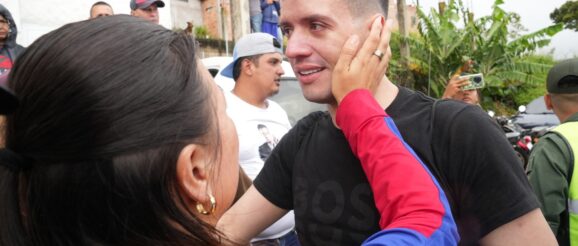Venezuelans deported to El Salvador mega-prison describe abuse

Carlos Daniel Terán, 19, still remembers the words a prison warden told him when he entered El Salvador’s mega-prison, CECOT.
“He told us we were never going to leave this place,” Terán recalled.
It was March of this year. Terán had just been transferred from an immigration detention center in Texas to the notorious Centro de Confinamiento del Terrorismo — known as CECOT — a maximum-security prison built to house accused Salvadoran gang members. El Salvador’s own justice minister once said the only way out of the prison was “inside a coffin.”

Terán was among hundreds of Venezuelans sent to El Salvador by the Trump administration, many under the 1798 Alien Enemies Act, a rarely-used wartime power. They were accused — without evidence — of being members of Venezuelan gang Tren de Aragua. For nearly four months, the U.S. government withheld the identities of the men it deported and barred them from contacting their families or lawyers.
Then just over a week ago, Terán was suddenly a free man — released alongside more than 250 other Venezuelan detainees as part of a prisoner exchange between the U.S. and Venezuela.
“Hell on earth”
Like Terán, the other Venezuelan’s sent to El Salvador from the U.S., have denied being affiliated to the Tren de Aragua.
Although he describes himself as a man of faith, Terán said his days at CECOT were really hard for him.
“I felt really sad — I spent my birthday there and it was hard to not get a call from my family,” he said.

Tamir Kalifa for /Tamir Kalifa
Inside CECOT, he and the other prisoners were rarely let out of their cells. The food consisted mostly of beans, tortilla and rice. The toilets in their cells were often clogged. And there was no air conditioning despite the hot and humid weather.
Prisoners could only bathe in water that was pumped into two cement tanks built into their cells. But only once a day, at a time set by the prison guards. There were no walls to separate the bathing areas, or the toilet, from the rest of the cell.
The detainees slept on metal planks arranged like bunk beds — no mattresses, blankets or pillows. Terán says he slept in a seating position the whole four months.
But Terán and the others say the worst part was how guards used violence against them.
According to Hernandez, 32, the prisoners would be dragged out of their cells for complaining about their conditions, taking a bath outside designated hours, or even for making too much noise.
Hernandez, who is openly gay, said he was once taken by the guards to “La Isla” after guards noticed him bathing with a bucket outside designated hours.
He said that he was beaten by three guards wearing masks. And forced to perform oral sex on one of the guards. After a couple of hours, he was dragged back to his cell.

“Condemned for life.”
Opened in January 2023 as part of President Nayib Bukele’s anti-gang crackdown, CECOT has remained largely off-limits to outside scrutiny—its image tightly controlled through polished government videos and staged photo ops with visiting officials, including U.S. Homeland Security Secretary Kristi Noem. The Venezuelans released last week are among the first former inmates to speak publicly about what they endured inside.
“The guards wanted us to be in total silence,” Hernandez said. “But for us that was very difficult, because by nature we Venezuelans are a happy people, who are accustomed to joking around, and screaming, even in dire conditions.”

Morales said that during the first month in CECOT, the Venezuelan prisoners held a hunger strike that lasted for three days, where they demanded, unsuccessfully, to have contact with their relatives, and more information about their cases. He says that some days later, the prisoners became more desperate and staged a “blood strike.”
Both Terán and Hernandez corroborated Morales’ account.
“We were treated like bargaining chips”
The Trump administration paid El Salvador $6 million to house the Venezuelan men, after accusing them of being members of the Tren de Aragua gang.
The Department of Homeland Security did not respond to the specific allegations made by the men. Instead, DHS Assistant Secretary Tricia McLaughlin repeated the accusation that they were members of the Tren de Aragua gang, but did not provide any evidence to back those claims.
Noah Bullock, the executive director of Cristosal, a Salvadoran human rights group said that the beatings and some of the other conditions described by the Venezuelan prisoners qualify as torture, and that by taking the Venezuelan prisoners to El Salvador, without notifying their lawyers, or their families, U.S. and Salvadorean authorities likely committed an act of forced disappearance.

El Salvador Press Presidency Office/Anadolu via Getty Images
“These are people who never had a trial, who were never convicted of anything, and were sent to a third country to be put into a maximum security prison indefinitely.” Bullock said. “Just on those grounds, you have clear due process violations.”
Cristosal conducted background checks on 160 of the 252 Venezuelans sent to El Salvador and also interviewed their families. The organization said that less than 10% had criminal records.
Bullock said around 400 prisoners have died in Salvadoran custody since March 2022, when President Nayib Bukele declared a state of exception that suspended key due process rights. Under the measure, authorities can hold suspects for months without disclosing their whereabouts or allowing contact with lawyers or family.
“We were treated like bargaining chips,” Hernandez said. “I don’t understand why Bukele had to offer his prisons, to kidnap migrants that had never set foot in his country.”
